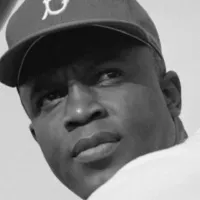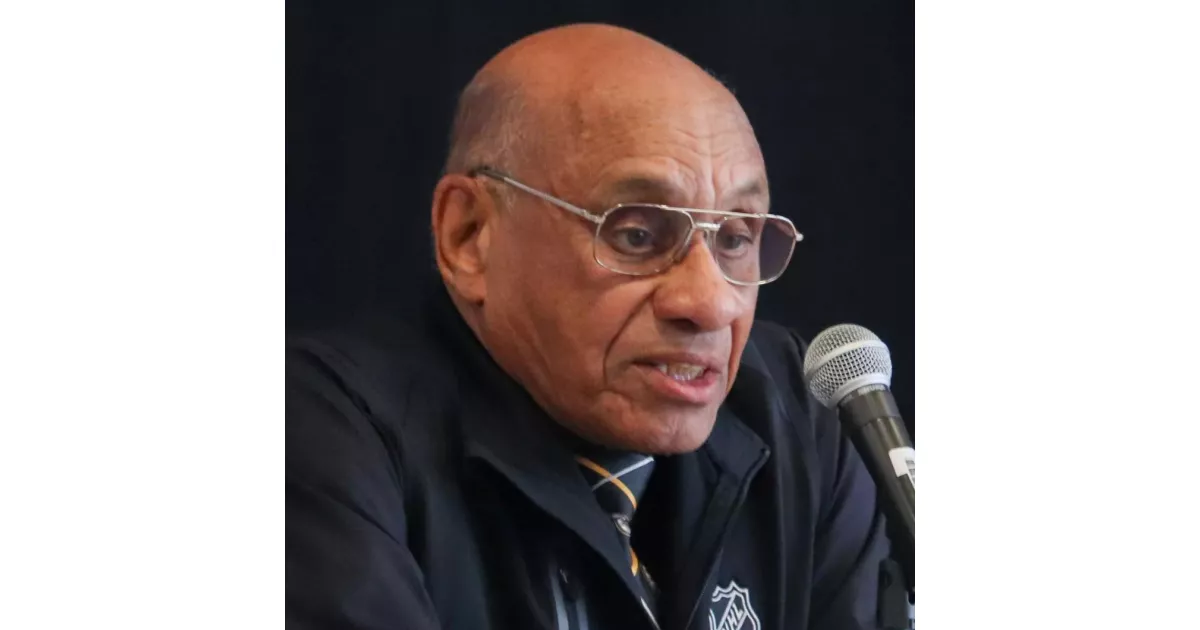Willie O'Ree, a former professional ice hockey player from Canada, made history as the first black player in the National Hockey League (NHL). Joining the Boston Bruins as a winger, O'Ree broke the color barrier in 1958, earning him recognition as the "Jackie Robinson of hockey." This monumental achievement is celebrated through the annual Willie O'Ree Community Hero Award, established by the NHL in 2018, the same year O'Ree was inducted into the Hockey Hall of Fame.
October 15, 1935: Willie O'Ree is Born
On October 15, 1935, Willie O'Ree, a prominent figure in hockey history, was born in Fredericton, New Brunswick, Canada.
1950: Art Dorrington Signs NHL Contract but Doesn't Reach the NHL
In 1950, Art Dorrington made history as the first black player to sign an NHL contract with the New York Rangers organization. Despite his talent, he faced racial barriers that prevented him from advancing beyond the minor leagues, highlighting the challenges black athletes faced during that era.
1955: Willie O'Ree Signs with the Quebec Aces
In 1955, Willie O'Ree began his professional hockey journey by signing with the Quebec Aces of the Quebec Hockey League (QHL).
January 18, 1958: Willie O'Ree Makes NHL Debut, Breaking the Color Barrier
On January 18, 1958, Willie O'Ree made history by becoming the first black player to compete in the National Hockey League (NHL). Playing for the Boston Bruins against the Montreal Canadiens, O'Ree's debut marked a pivotal moment in the sport, breaking the color barrier and paving the way for future generations of black hockey players.
1960: Willie O'Ree Experiences Racism in Chicago Stadium
During a game against the Chicago Blackhawks in 1960, Willie O'Ree faced severe racism. Subjected to racial slurs from both players and fans, he endured physical assault from Eric Nesterenko, resulting in injuries. This incident highlighted the pervasive racism within hockey at the time and the challenges O'Ree faced as a black player.
1960: O'Ree Honored with Original Jersey
In 1960, Willie O'Ree was honored with an original number 22 Bruins uniform jersey from the 1960–61 Boston Bruins season by John Grzelcyk, a member of the Boston Garden and TD Garden "bull-gang" team.
1961: Willie O'Ree's Success in the Western Hockey League
Following his time in the NHL, Willie O'Ree achieved significant success in the Western Hockey League (WHL), showcasing his skills and perseverance. He secured two scoring titles during his time in the league, demonstrating his talent and determination.
1961: Willie O'Ree's Continued Challenges with Racism and His Trade to the Montreal Canadiens
In 1961, Willie O'Ree continued to face racism, particularly after being traded to the Montreal Canadiens. Despite his talent, he was denied a fair tryout due to his race and relegated to a minor league team. This experience further illustrated the deep-seated racism within hockey and the obstacles O'Ree encountered.
1964: Willie O'Ree's Scoring Prowess in the WHL
During the 1964-65 season in the Western Hockey League, Willie O'Ree exhibited his scoring prowess by achieving a career-high of 38 goals, demonstrating his offensive capabilities.
1968: Willie O'Ree Matches his Scoring Record in the WHL
Willie O'Ree matched his career-high of 38 goals during the 1968-69 season in the Western Hockey League, further solidifying his reputation as a skilled scorer.
1972: Willie O'Ree's Stint with the New Haven Nighthawks
In the 1972-73 season, Willie O'Ree had a brief stint with the New Haven Nighthawks of the American Hockey League, adding to his diverse hockey experience.
1974: Mike Marson Becomes the Second Black Player in the NHL
In 1974, Mike Marson, another talented Canadian player, was drafted by the Washington Capitals, marking a significant milestone as he became the second black player to enter the NHL after Willie O'Ree.
1974: Willie O'Ree Retires from Professional Hockey
In 1974, Willie O'Ree decided to retire from professional hockey after a long and successful career in the minor leagues.
1984: Willie O'Ree Inducted into New Brunswick Sports Hall of Fame
In recognition of his significant contributions to the sport of hockey, Willie O'Ree was inducted into the New Brunswick Sports Hall of Fame in 1984.
1998: Willie O'Ree Becomes NHL's Diversity Ambassador
In 1998, Willie O'Ree's commitment to creating a more inclusive hockey community was recognized when he was appointed as the NHL's Diversity Ambassador. In this role, he traveled extensively, visiting schools and hockey programs across North America to advocate for diversity, dedication, and self-belief, inspiring a new generation of hockey players and fans.
1998: Willie O'Ree Takes on New Role Promoting Diversity in Hockey
In 1998, while working at the Hotel Del Coronado in San Diego, California, Willie O'Ree was approached by the NHL for a meaningful opportunity. He accepted the position of director of youth development for the league's diversity task force, demonstrating his commitment to fostering inclusivity within hockey.
January 19, 2008: Willie O'Ree Honored on 50th Anniversary of NHL Debut
On January 19, 2008, the Boston Bruins and NHL deputy commissioner Bill Daly held a special ceremony at TD Garden to commemorate the 50th anniversary of Willie O'Ree's groundbreaking NHL debut. The event was a testament to O'Ree's lasting impact on the sport.
February 5, 2008: ESPN Features Willie O'Ree for Black History Month
On February 5, 2008, ESPN aired a special feature on Willie O'Ree in honor of Black History Month, highlighting his journey, achievements, and impact on the sport of hockey.
October 29, 2008: San Diego State University Honors Willie O'Ree
On October 29, 2008, San Diego State University recognized Willie O'Ree's commitment to diversity and cross-cultural understanding by presenting him with an Award for Outstanding Commitment to Diversity and Cross Cultural Understanding.
2008: Willie O'Ree Appears on "Everybody Hates Chris"
In 2008, Willie O'Ree and fellow hockey player Kevin Weekes made a special appearance on the popular sitcom "Everybody Hates Chris." Their appearance in the episode "Everybody Hates Gretzky" brought their stories and the message of diversity in hockey to a wider audience.
March 2012: Buffalo Sabres Host Willie O'Ree Skills Weekend
The Buffalo Sabres paid homage to Willie O'Ree's impact on hockey by hosting a special Willie O'Ree skills weekend in March 2012, providing young players with the opportunity to learn from his experience and be inspired by his story.
October 16, 2015: San Diego Gulls Retire Willie O'Ree's Jersey
In a tribute to his remarkable career and contributions to the team, the San Diego Gulls retired Willie O'Ree's jersey on October 16, 2015, ensuring his legacy would be forever etched in the franchise's history.
2016: Joel Ward Advocates for NHL to Retire Willie O'Ree's Number
As the 2016 Stanley Cup Finals approached, San Jose Sharks player Joel Ward, inspired by Willie O'Ree's legacy, advocated for the NHL to retire O'Ree's number 22 league-wide. Ward drew parallels to Jackie Robinson's retired number 42 in Major League Baseball, highlighting the significance of recognizing pioneers who broke racial barriers in their respective sports.
November 3, 2017: Springfield Thunderbirds Honor Willie O'Ree
The Springfield Thunderbirds paid tribute to Willie O'Ree's contributions to hockey with a special pregame ceremony on November 3, 2017. They unveiled a banner in his honor, commemorating his time with the Springfield Indians and recognizing his impact on the sport.
2017: NHL Introduces the Willie O'Ree Community Hero Award
To honor Willie O'Ree's enduring legacy and impact, the NHL established the annual Willie O'Ree Community Hero Award in the 2017-18 season. This prestigious award recognizes individuals who, through their involvement in hockey, have made significant positive contributions to their communities, cultures, or society as a whole.
June 26, 2018: O'Ree to be Inducted into Hockey Hall of Fame
On June 26, 2018, it was announced that Willie O'Ree would be inducted into the Hockey Hall of Fame as a builder later that year.
November 1, 2018: Street Hockey Rink Named in O'Ree's Honor
On November 1, 2018, a street hockey rink in Boston's Allston neighborhood was named in honor of Willie O'Ree.
2018: Willie O'Ree's Induction into the Hockey Hall of Fame and Establishment of the Willie O'Ree Community Hero Award
In 2018, Willie O'Ree was inducted into the Hockey Hall of Fame, a testament to his significant contributions to the sport. This momentous year also saw the inception of the annual Willie O'Ree Community Hero Award, launched by the NHL in his honor.
May 2019: Bill for Congressional Gold Medal Introduced
By May 2019, a bill was introduced in the 116th U.S. Congress to award Willie O'Ree the United States Congressional Gold Medal for his achievements and contributions to hockey, inclusion, and recreational opportunity.
May 27, 2020: O'Ree Named to Canada's Sports Hall of Fame
Willie O'Ree was named to Canada's Sports Hall of Fame in the Builder category on May 27, 2020.
January 12, 2021: Bruins to Retire O'Ree's Number 22
The Boston Bruins announced on January 12, 2021, that they would retire O'Ree's number 22 on February 18.
October 3, 2021: O'Ree Formally Inducted into Canada's Sports Hall of Fame
On October 3, 2021, Willie O'Ree was formally inducted into Canada's Sports Hall of Fame after a postponement due to COVID-19 concerns.
2021: NHL Players Wear Commemorative Decal for O'Ree
During Black History Month in 2021, all NHL players wore a commemorative helmet decal honoring Willie O'Ree.
January 18, 2022: O'Ree's Number 22 Retired by the Bruins
On January 18, 2022, the NHL held a ceremony to retire Willie O'Ree's number 22, honoring his legacy with the Boston Bruins.
2022: O'Ree Awarded Congressional Gold Medal
In 2022, US President Joe Biden signed the Willie O'Ree Congressional Gold Medal Act, awarding O'Ree a Congressional Gold Medal for his contributions to "hockey, inclusion and recreational opportunity."
October 30, 2023: Canada Post Releases Commemorative Stamp
Canada Post released a commemorative postage stamp on October 30, 2023, honoring Willie O'Ree.
Mentioned in this timeline

Joe Biden is an American politician who served as the...
California is a U S state on the Pacific Coast...

Jackie Robinson was a pivotal figure in American history As...
The Montreal Canadiens nicknamed the Habs are a professional ice...

Chicago is the most populous city in Illinois and the...
Canada is a North American country the second largest in...
Trending

45 minutes ago Civil Rights Icon Jesse Jackson Passes Away at 84: A Legacy Remembered

1 day ago Democrats and Europe grapple with Trump's impact; Newsom says Trump unified Europe.

46 minutes ago Elise Mertens faces Emma Navarro in WTA Dubai 2026; Predictions and Odds

1 day ago Iva Jovic Inspired by Djokovic, Competes in WTA Dubai, Faces Anisimova.

2 hours ago Magda Linette Advances to WTA Dubaj Round 2, Fr?ch Eliminated, Other Final Matches

2 hours ago Clara Tauson vs. Peyton Stearns: WTA Dubai 2026 Match Prediction and Preview
Popular
Randall Adam Fine is an American politician a Republican who...

Pam Bondi is an American attorney lobbyist and politician currently...

Kid Rock born Robert James Ritchie is an American musician...

Barack Obama the th U S President - was the...
The Winter Olympic Games a major international multi-sport event held...

XXXTentacion born Jahseh Dwayne Ricardo Onfroy was a controversial yet...
